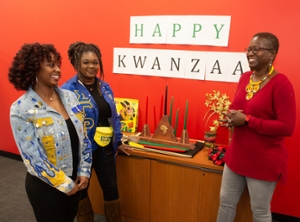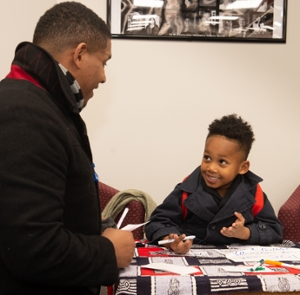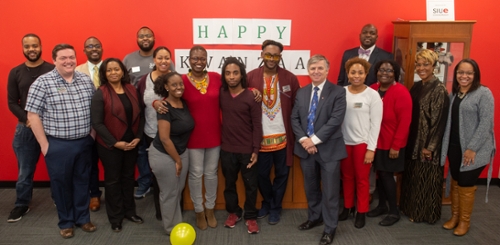 Students, staff, faculty and children gathered Thursday, Dec. 6 for Southern Illinois University Edwardsville’s campus-wide celebration of the African American holiday, Kwanzaa, to promote unity and culture, among other things.
Students, staff, faculty and children gathered Thursday, Dec. 6 for Southern Illinois University Edwardsville’s campus-wide celebration of the African American holiday, Kwanzaa, to promote unity and culture, among other things.
The SIUE Black Faculty and Staff Association (BFSA), SIUE Black Studies Program, the SIUE National PanHellenic and the Office of the Chancellor hosted the Kwanzaa observance at SIUE’s Center for Student Diversity and Inclusion (CSDI).
Kwanzaa, a celebration of family, community and culture from Dec. 26-Jan. 1, was created by Dr. Maulana Karenga in 1966. The seven-day holiday is centered on principles that are each designated to one day.
 The names of the principles in Swahili and their English meanings:
The names of the principles in Swahili and their English meanings:
Umoja – Unity (Dec. 26)
Kujichagulia – Self-determination (Dec. 27)
Ujima – Collective work and responsibility (Dec. 28)
Ujamaa – Cooperative economics (Dec. 29)
Nia – Purpose (Dec. 30)
Kuumba – Creativity (Dec. 31)
Imani – Faith (Jan. 1)
“Kwanzaa is a good way for those in the African American community to cherish and celebrate our culture and one another, learn from each another, review the past, and set goals for the future,” said Lakesha Butler, PharmD, BFSA president, and clinical professor in the School of Pharmacy. “Being able to interact with students and other African American faculty and staff at a social gathering helps to improve morale, and provides a sense of community that contributes to our belonging.”
 “In addition to being egregiously dehumanizing, the enslavement of Africans led to numerous deleterious effects, like disconnection from culture of origin (e.g., language, customs, history),” said Courtney Boddie, PhD, CSDI interim director and Counseling Services director. “Most people draw on this rich cultural history as a source of strength. The development of Kwanzaa currently acts as a reclamation of aspects of these roots, additionally offering opportunities for community building.”
“In addition to being egregiously dehumanizing, the enslavement of Africans led to numerous deleterious effects, like disconnection from culture of origin (e.g., language, customs, history),” said Courtney Boddie, PhD, CSDI interim director and Counseling Services director. “Most people draw on this rich cultural history as a source of strength. The development of Kwanzaa currently acts as a reclamation of aspects of these roots, additionally offering opportunities for community building.”
During SIUE’s Kwanzaa celebration, each of the seven principles and their meanings were displayed on the walls throughout the CSDI. An activity was also assigned to each principle, such as “List a few ways in which Ujima can be practiced at SIUE.”
“My family has celebrated Kwanzaa for more than 30 years,” said Kathryn Bentley, SIUE Black Studies Program director and associate professor in the Department of Theater and Dance. “It is a time for us to come together and reaffirm our commitment to values that fortify us throughout the year. I thought it was important to introduce Kwanzaa to our campus, as we strive to build community with our black faculty, staff and students. We are looking forward to continuing this as an annual tradition to complement other activities and gatherings that promote a sense of togetherness and belonging.”
“Kwanzaa is significant, because it takes African Americans back to African origins,” said Jarron Sorrell, a senior majoring in chemistry, who said he was first introduced to the holiday as a kindergartener in Chicago. “I know enough about Kwanzaa that I could write a book. I want to start practicing it more and not just talk about it on a surface level.”
Freshman Armon Adkins said he knew nothing about Kwanzaa until he was invited to SIUE’s observance. “I hope to gain some knowledge about Kwanzaa and see how it can help me,” said Adkins, who is majoring in exercise science.
“I’m enjoying being here with all these beautiful people. I feel so good and comfortable,” said Ahnnyshia Hibler, a senior majoring in business. “I came to mix and mingle with the black community on campus. I also want to learn more about Kwanzaa.”
When asked about their favorite Kwanzaa principle, at least three people chose Nia.
“Without purpose, the other Kwanzaa principles are meaningless,” said Anthony Cheeseboro, BFSA immediate past president and associate professor in the Department of Historical Studies.
Butler and Boddie are also partial to Nia.
“I believe Nia to be a key factor in mental health, which can be undermined by racism as a source of potentially traumatic stress,” remarked Boddie. “We see in the data and in psychotherapeutic practice that identifying a sense of purpose often leads to a sense of direction, which can buffer the effects of various general life and identity-specific stressors.”
“Everything begins with purpose,” said Butler. “The reason we get out of bed each morning should be to fulfill our daily purpose in life. My purpose in life is to make this world a better place and to help others discover their purpose.”
Photos:
Kathryn Bentley (right), director of the SIUE Black Studies program and associate professor in the Department of Theater and Dance, talks to students about the fundamentals and principles of Kwanzaa. Shown (L-R) Kamariah Lewis, a senior majoring in public health and National Pan-Hellenic Council (NPHC) president; and Shanice Davis, a senior majoring in social work and NPHC compliance officer.
Tyrone Johnson Jr., a junior majoring in exercise science, talks with his some Tyrone Johnson III at the Kuumba station.